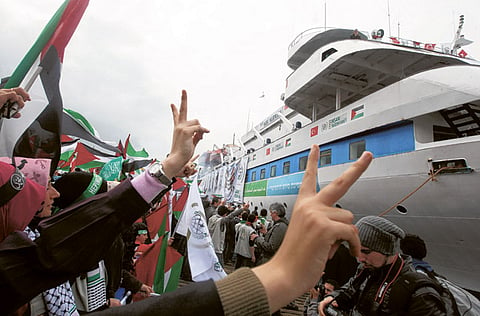Healthy man in a sick Europe
Reviving its historical Middle East ties helps Turkey assert itself in the affairs of the Islamic world

Last year Turkey's Hurriyet Daily News asked me to do a piece on how the Arab world — its traditional leaders like Egypt, Saudi Arabia and Syria — views Ankara's growing involvement in the Middle East.
This was before Turkey found itself in the global spotlight after Israel attacked the Mavi Marmara, the vessel carrying aid for Gaza, killing nine Turkish peace activists. The Hurriyet asked me to examine if the big boys of the Middle East felt challenged by Turkey's overarching clout in the region.
Frankly, the whole notion of rivalry sounded somewhat absurd to me and I said it as much in my piece. If the Arab street has responded rapturously to Turkey's moves to revive its historical ties with the Middle East, powers that be aren't exactly losing sleep over the Turkish interest in the region.
If anyone ought to get insecure about Ankara looking east, it's the US and its ‘only ally and friend' Israel. No matter how its friends and foes view its new geopolitical priorities, one thing is for sure: Turkey has finally arrived.
While an awful lot has been said and written about the breathtaking rise of Asian giants China and India, the other big story of success and economic transformation missed by pundits is Turkey.
Following the demise of the Ottoman empire in the last century and after its spoils were duly divided among the thieves, the Orientalists came up with the term ‘Sick Man of Europe' to describe the superpower whose empire once extended from North Africa in the south to Hungary in the north and from Greece and Macedonia in the West to Xinjiang in Asia (now in China).
In fact, this condescending view of Turkey has been at the heart of the vehement opposition to the largely Muslim country joining the white, elite Christian club that is the European Union.
So what do you call it but a cruel irony of history that even as the EU struggles, Turkey has emerged as the ‘healthy man of (sick) Europe.' The recession has been particularly cruel to the continent.
Debt tsunami
The tsunami generated by the collapse of Greece and Ireland now threatens the established and once apparently secure economies like Spain, Britain and others. The generosity of big players like Germany has failed to suppress the panic that has the whole continent in its grip.
Across the Bosporus in Turkey, things have never been better.
The country has registered an incredible growth rate of 11.7 per cent over the last year. The fastest in six years, points out Bloomberg.
Incredibly, at a time of the continuing global slump, Turkey has been investing big time in its backyard in east European nations to Central Asian republics and the Middle East of course.
Even as it is courting investors from around the world, especially from the Middle East, Ankara is aggressively investing in projects in the neighbourhood and beyond. These projects worth billions of dollars will not just generate millions of jobs in these countries in years to come, they are sure to generate loads of goodwill, adding several feet to Turkey's stature.
Modern face
It's not all economics though. Under the aggressive leadership of Prime Minister Recep Tayyip Erdogan, Turkey appears determined to restore its ties with the Muslim world and reclaim its lost glory. It's working to restore the fabled Hijaz railway line that once connected the holy city of Madinah with Istanbul. Secondly, it's joined hands with Central Asian states and China to build a new railway line that will connect Turkey to Urumqi in Xinjiang.
At home, the governing Justice and Development Party has defanged the all-power military establishment, taking total control of the power structure in its true sense.
By successfully marrying Islam with democracy and progress with tradition, Erdogan's Turkey is demolishing all the myths and stereotypes long associated with Islam.
For decades after the end of the Ottoman caliphate, the so-called Young Turks of Mustafa Kemal Pasha tried their best to sever the robust emotional and intellectual bonds with the Muslim world. Islam and Arabic language were practically banished. Even the humble Muslim headscarf was banned in government offices and schools and universities. Kemalist Turkey looked Westwards for inspiration.
All this has changed under Erdogan.
If after decades of military alliance with Israel, Turkey is now aggressively speaking up for the Palestinians and has the audacity to stand by an isolated Iran. This is not a coincidence. Its close alliance with the US and its Nato membership haven't deterred Ankara from saying it as it is on issues that exercise a billion believers. Who can forget the lashing Erdogan gave Shimon Peres in Davos after Israel's murderous, 2008 Christmas offensive on Gaza?
The new Turkey shows that you need not part with your beliefs and convictions to negotiate the demands of a modern world. Faith and progress can go hand in hand.
At a time when the gulf between the West and Islam is at its widest, Turkey could be the bridge that it already is, geographically. The Middle East could certainly do with an honest broker, who is really honest.
Aijaz Zaka Syed is a Dubai-based commentator who has written extensively on the Middle East and South Asia.



